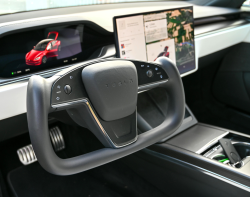
—
A Tesla Full Self-Driving (FSD) lawsuit that was dismissed will remain dismissed after the plaintiff failed in his appeal of the dismissal of the New York Tesla class action lawsuit.
According to the lawsuit, New York plaintiff Michael Nachman visited a Tesla showroom in December 2016 where a salesperson helped him purchase a vehicle. The plaintiff asserts the Tesla website said “[a]ll Tesla vehicles . . . have the hardware needed for full self-driving capability.”
The plaintiff complains he paid an additional $8,000 for the FSD package advertised as “enabling full self-driving in almost all circumstances,” while noting that “[i]t is not possible to know exactly when each element of the functionality described above will be available.”
In October 2020, Tesla allegedly announced some current owners would need to pay an additional $1,000 for an upgrade to the hardware to use Full Self-Driving. But the class action lawsuit alleges the plaintiff and all Tesla customers in New York paid a lot for FSD but never received the features.
Tesla allegedly offered customers nothing but false advertising and misleading claims about Autopilot, Enhanced Autopilot and Full Self-Driving capabilities. And the plaintiff claims he was “injured” because he paid a premium price for a vehicle based on Tesla’s deceptive marketing.
Tesla Full Self-Driving Lawsuit Dismissed
In its motion to dismiss the class action, Tesla argued the plaintiff waited too long to file his lawsuit, far beyond the three-year statute of limitations in New York. Judge Rachel P. Kovner agreed and dismissed the Tesla FSD lawsuit.
The judge also noted how the plaintiff complained about Tesla wanting an extra $1,000 from certain owners for hardware upgrades, but the judge found the plaintiff didn’t claim he was one of those owners. The plaintiff also didn’t claim he paid any additional money to Tesla for automated driving features after he bought the car.
Tesla FSD Lawsuit Dismissal Appealed
Plaintiff Nachman requested leave to modify his FSD lawsuit and refile it, but the district court denied his motion to amend his class action. According to the plaintiff, he wanted to add allegations about an “Infotainment Upgrade” he purchased for his Tesla on May 3, 2022.
However, the judge reasoned it would not do any good because the original Tesla FSD lawsuit was still filed too late.
The plaintiff appealed to the U.S. Court of Appeals for the Second Circuit which agreed with the earlier district court dismissal of the FSD lawsuit.
“Accordingly, we agree with the district court that Nachman’s claim is untimely. Nachman waited until October 5, 2022—almost six years after purchase—to file this action seeking to recover the premium he paid at purchase. It is plain from the face of the complaint, then, that he failed to timely file this lawsuit.” — Second Circuit
The Second Circuit did say the three-year statute of limitations in New York may be “equitably tolled” (suspended) under certain circumstances, but the “district court determined that Nachman had abandoned any tolling argument, and Nachman does not contest this conclusion on appeal.”
The Tesla FSD lawsuit was filed in the U.S. District Court for the Eastern District of New York (Central Islip): Michael Nachman v. Tesla, Inc., et al.
The plaintiff is represented by Reese LLP.

